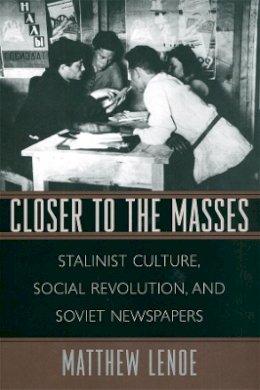
Closer to the Masses: Stalinist Culture, Social Revolution, and Soviet Newspapers (Russian Research Center Studies)
Matthew Lenoe
In this provocative book, Matthew Lenoe traces the origins of Stalinist mass culture to newspaper journalism in the late 1920s. In examining the transformation of Soviet newspapers during the New Economic Policy and the First Five Year Plan, Lenoe tells a dramatic story of purges, political intrigues, and social upheaval.
Under pressure from the party leadership to mobilize society for the monumental task of industrialization, journalists shaped a master narrative for Soviet history and helped create a Bolshevik identity for millions of new communists. Everyday labor became an epic battle to modernize the USSR, a fight not only against imperialists from outside, but against shirkers and saboteurs within. Soviet newspapermen mobilized party activists by providing them with an identity as warrior heroes battling for socialism. Yet within the framework of propaganda directives, the rank-and-file journalists improvised in ways that ultimately contributed to the creation of a culture. The images and metaphors crafted by Soviet journalists became the core of Stalinist culture in the mid-1930s, and influenced the development of socialist realism.
Deeply researched and lucidly written, this book is a major contribution to the literature on Soviet culture and society.
Product Details
About Matthew Lenoe
Reviews for Closer to the Masses: Stalinist Culture, Social Revolution, and Soviet Newspapers (Russian Research Center Studies)
Stephen Lovell
Moscow Times
Lenoe argues that in the late 1920s, Soviet newspapers transformed themselves from educators (offering propaganda) to mobilizers (agitators) of the reading public. This 'mass journalism' eschewed conventional 'news' for stories that glorified the industrialization of Soviet Russia. The style of writing, modeled on the tales of adventure that engaged young male readers, became the prototype for the socialist realism of Stalinist literature...Lenoe is persuasive in showing the party's manipulation of the press and the cooperation of editors and reporters in the enterprise.
D. Balmuth
Choice
The way in which Lenoe connects the Stalinist mobilization project with the central problem of...political legitimacy is especially valuable.... Using materials that have been little studied, Lenoe has posed very important questions about Soviet political culture and drawn interesting and unexpected conclusions that allow us to view the formation of Soviet media in new ways.
Evgenii Dobrenko
Novoe Literaturnoe Obozrenie [Russia]
